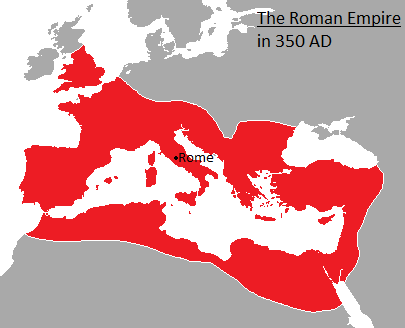So perhaps you could answer my question: How did Constantine influence Christianity in Persia, Armenia, or India?
By 324 A.D. Constantine had established himself as ruler over the whole Roman Empire. By 337, some 13 years later he passed away. He would have had some influence on the East, and I understand his 2 sons ruled after him, one had the Eastern Empire, and the other in the West.
Beyond conflicting accounts, cold hard facts are hard to come by. James White says,Does your video get into how Constantine--who opposed the Nicene confessors and supported the Arians--was able to enforce a paganization of Christianity to people living thousands of miles away from the Roman Empire?
"We are dependent, in large measure, on the words of Eusebius of Caesarea for our knowledge of many of the events at the council. This is somewhat unfortunate, because Eusebius, the first “church historian,” was a partisan participant as well. Historians recognize that his viewpoint is influenced by his desire for the favor of the Emperor and by his own political and theological goals and positions. Philip Schaff, in reproducing Eusebius’s description of the entrance of the Emperor into the council, speaks of Eusebius’s “panegyrical flattery.”9 Eusebius presents Constantine in the highest possible terms so as to enhance his own position. http://www.equip.org/article/what-really-happened-at-nicea/
I would imagine anyone not towing the official line would be excommunicated and their followers persecuted.What kind of influence do you believe Constantine had in the Sasanian Empire?
I try to be fair minded. I came across quotes attributed to Eusebius in which he was said to have claimed, he reported what would benefit Christianity, and expunged anything damaging. On further investigation, the quotes were incorrect, but the whole episode took me half a day to resolve.Here's the problem, you're basically just offering your own version of the Jack Chick history of religion;
I meet such people all the time, and they go silent when you ask for evidence.it's of the same quality as the claims that Muslims worship a moon god and that the Vatican was responsible for the creation of your religion (no, really, there are people who believe that).
Fair enough. History changes depending on who is doing the reporting, and how they viewed the Catholic Church. There are some points that I would put forward as Historical facts:I take the things your presenting with all the same seriousness I take those other things--that is, I don't. Because it's conspiracy theory, fabrication, and nonsense.
Constantine was shrewd politician, accomplished military leader, trusted no one, and was power hungry.
He followed Paganism and Sun worship, as did the elect, and Roman soldiers.
Only 13% or 18% depending on how many Bishops you believe attended of the 1800 Bishops invited to the Council of Nicea turned up, and of them only 2 voted against.
The 50 official NT copies written would have been the only books acceptable to preach from, all previous works were ordered to be gathered and burnt.
The sheer volume of misinformation available is astonishing. I once watched a documentary about Constantine known as Constantine's Sword, it was a good budget well produced documentary but the problem is that even right from the beginning it got something that is really easy to learn completely wrong. In Constantine's Sword the narrator alleges that IHS, often found in Catholic art and architecture, is an abbreviation of the Latin phrase "in hoc signes vinces", "in this sign, conquer" the phrase supposedly uttered in Constantine's vision prior to the Battle at the Milvian Bridge.
I haven't seen that doc, the one I watched spoke about his vision before the battle at Milvian Bridge with Maxentius:
The author Eusebius, a Constantine apologist, also described the event in “Life of Constantine,” which he wrote after Constantine’s death in 337. According to Eusebius, Constantine saw a vision of a cross rather than the letters of Christ.
“He saw with his own eyes the trophy of a cross of light in the heavens, above the sun, and bearing the inscription, CONQUER BY THIS. At this sight he himself was struck with amazement, and his whole army also, which followed him on this expedition, and witnessed the miracle,” wrote Eusebius.
The following day, Constantine’s outnumbered forces defeated Maxentius’ forces.
Constantine ordered his troops to paint crosses on their shields and banners.
A Mural was painted by the artist Raphael, though I don't think he completed it, leaving that task to his students.
https://upload.wikimedia.org/wikipedia/commons/1/19/Raphael_Vision_Cross.jpg
The Vision of the Cross - Wikipedia
"Εν τούτῳ νίκα", i.e. "By this, conquer" or Latin, "In this sign you shall conquer."
The only problem being this likely didn't happen, because as the Documentary I posted, examines the Arch the Roman Senate built to commemorate the battle some 3 years later, The Arch of Constantine does not depict crosses or anything of the sort, rather it is dripping in Pagan symbolism.
Furthermore when Constantine moved his base to Turkey, he didn't name change the City Byzantium to anything in honour of Christianity, rather he honoured himself using the name Constantinople.
Upvote
0

